 Saturday, July 9 we had our second discussion of the book we are currently reading together, Women Counseling Women. One of the things I most appreciate about this book is that the general editor, Elyse Fitzpatrick, starts with the gospel (the topic of the first two chapters and our first meeting) and is now setting a solid foundation for the way we approach the Word of God.
Saturday, July 9 we had our second discussion of the book we are currently reading together, Women Counseling Women. One of the things I most appreciate about this book is that the general editor, Elyse Fitzpatrick, starts with the gospel (the topic of the first two chapters and our first meeting) and is now setting a solid foundation for the way we approach the Word of God.
Chapter 3 starts with a discussion of the terms, “hermeneutics” and “genre”, which can have some of us saying, “Herman who and what?” The goal is not to impress or confuse anyone with theological terms; the goal is to clearly understand God’s Word, and ironically, that’s what hermeneutics means – the science of interpretation, with the goal of a clear understanding! In this case, we are talking about discerning what the Word of God means. 2 Timothy 2:15 says,
Be diligent to present yourself approved to God as a workman who does not need to be ashamed, accurately handling the word of truth. (NASB)
That is our goal as believers – to be accurate in the way we handle God’s Word; we must not twist Scripture to try to make it say what we want to hear. In 2 Peter 1:20 we read,
knowing this first of all, that no prophecy of Scripture comes from someone’s own interpretation.
We live in a world of “here’s what I think it means,” or, “here’s what it means to me,” (note the emphasis on self) when the real question to be answered is, “What did the author mean?” This involves learning the Who, What, Where and When of the Scripture passage before we ever begin applying it to ourselves. When it comes to the Word of God, the intent of the Author is the thing we must seek to understand. That will involve work, study and prayer, but sometimes we just don’t know where to start. To help with this, we recommended two resources, Living by the Book, by Howie Hendricks, and an illustration from the book, Grasping God’s Word by Duvall and Hays. Thankfully, someone else found the illustration of a “principalizing bridge” helpful, and put it online (http://www.cornerstonebuzz.org/wp-content/uploads/pdf/journey-4-notes.pdf) The illustration points out the importance of getting the sense of the passage in its original setting before trying to bridge over into modern day life. If we don’t, we are liable to “read in” to the passage modern thinking rather than “draw out” the original meaning.
As we seek to properly understand the text of Scripture, it will involve the other word-of-the-week, “genre”. Genre is just a fancy French way of saying “kind or type.” In the Old Testament there are different types of literature – law, prophecy, wisdom, poetry, etc, and in the New Testament we have the gospels and letters, to name some of them. The key is to not confuse the types. For example, when we read in Psalm 98:8 “Let the rivers clap their hands, let the hills sing for joy together.” We understand that this is poetry, a figurative expression and not literal hand-clapping rivers or singing mountains. We also need to understand the historical setting of promises given, and to whom they were given, so that we are not pulling verses out of various places to make the Bible say what we want it to say.
We could spend weeks on this topic alone, but since we only had an hour and a half, we moved on to the topic of chapter 4, discernment. Our discernment (or understanding) as believers grows as we grow spiritually, and it is directly connected to our proper handling of the Word of God. The only way to get better at discerning truth from error is to spend a lot of time with truth! On page 52 the author says it this way: We learn to discern truth from error by constant and close study of the real thing, God’s Word.
Not only are we to know God’s Word, we are also to “test” what others say by the Word of God. Our author quotes 1 Thessalonians 5:21-22,“test everything; hold fast for what is good. Abstain from every form of evil,” and then says,
Believers are to examine what they think, hear, see, and do, and measure it all against what God’s Word says. What you think of and understand about God (that is, your theology) will always drive your responses to everything in life. (p. 57)
As we learn what God says in His Word, and begin to discern truth from error in the world in which we live, the outcome should be living out what we know to be true. This always brings us back to the gospel and the grace of God, because we cannot live the Christian life apart from the Savior who loved us and gave Himself for us. So, don’t despair – sanctification is an ongoing process, and God is at work making us more like His Son (Romans 8:29).
Our next meeting is August 13. I will spend just a few minutes talking about chapter 5 (Women’s Ministry) and then Karen Anderson will join in to discuss the topic of dealing with your emotions (chapter 6). This is an issue we all need to approach from a biblical point of view, and we hope to see you then!
Dianne
For the T2W team

0 Comments